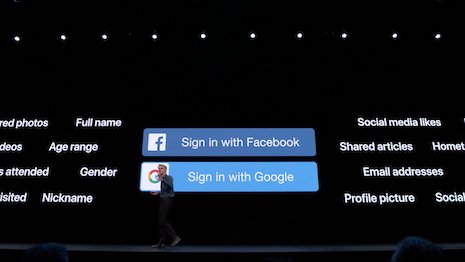Technology giant Apple is continuing its pro-privacy crusade, but its latest features may alienate many developers and advertisers.
With Apple’s forthcoming iOS 13, announced during its Worldwide Developers Conference on June 3, it will be easier than ever for consumers to protect their personal information and prevent third parties from exploiting user data. This places Apple in direct opposition to technology companies Google and Facebook, who have drawn user and government scrutiny over their use of consumer data.
“The fact that Apple continues to position itself toward privacy is not surprising,” said Dan Goldstein, president and owner of Page 1 Solutions, Lakewood, CO. “The company has been trending this way since Facebook got caught in its privacy scandals, and the features outlined at WWDC are another step in that path.
“Most consumers treat online ads as a nuisance, and sometimes they are,” he said. “However, targeted display advertising is a powerful tool for connecting consumers with the goods and services they care about.
“To the extent that Apple’s new data privacy features negatively impact user experience in apps offered by Google and Facebook, that may hurt advertisers and consumers alike.”
Protecting personal data
One of the most important announcements at WWDC was the debut of “Sign in with Apple,” a new way for users to log in to mobile applications and Web sites.
According to Apple, users will be able to sign in using their existing Apple ID after confirming through Face ID or Touch ID.
Apps are still able to request names and email addresses, but Apple will offer an option to create a unique, random email address that forwards messages to users’ real inboxes.

Apple’s iOS 13 will be available this fall with new privacy updates. Image credit: Apple
Ultimately, this ensures that users’ activity cannot be tracked within the app and tied to their profiles.
Sign-in options with Facebook and Google are already ubiquitous and valuable revenue streams. While these one-click options are convenient, since users do not have to create new passwords for each new application, it comes at the cost of privacy since developers are able to track individual users.
Apple will also be requiring that all third-party apps will need to include Apple sign in options to be listed on the App Store. However, developers will no longer have the ability to mine the personal data of consumers using this option for future marketing purposes.
Many luxury brands and retailers, including Dior, Gucci and Farfetch, have apps available to download through the App Store.
According to a survey from Kelton Research and SheerID, two to one consumers want brands to request consent before using their personal data. Only 8 percent are comfortable with marketers looking into social channels for individualized information such as likes and activity for promotional purposes, including discounts (see story).

Net-A-Porter recently updated its mobile offerings. Image credit: Net-A-Porter
There will be other privacy-focused updates included in the new iOS launch this fall.
HomeKit Secure Video will soon allow video feeds from third-party cameras to be encrypted and sent to iCloud. Users will also have the ability to allow apps to access their location “only once,” instead of existing options such as “always” and “when using the app.”
“I think it’s also important to recognize that users won’t have full autonomy over their data and privacy with these features,” Mr. Goldstein said. “With Sign in with Apple, for instance, Apple is still effectively managing your data.
“You may be further removed from third-party access to your information, but it's not a ‘purely private’ experience,” he said.
Corporate criticisms
These latest features are one way that Apple is positioning itself as an outlier in the technology sector. Other big tech mainstays, including Google, Facebook and Amazon, have been criticized for lax privacy policies.
In a February 2019 report, lawmakers in the United Kingdom accused social network Facebook of violating data privacy laws.
Parliament’s Digital, Culture, Media and Sport select committee found that the platform “intentionally and knowingly” violated both data privacy and competition laws. The committee also publicly requested that social media companies be held liable for harmful content on their platforms and that political advertising laws be updated (see story).
Decreasing permanence and increasing private communication, Facebook CEO Mark Zuckerberg has detailed steps the company would like to take in the future to do what it believes will better serve its audience in a recent blog post (see story).
Amazon’s Alexa voice assistant and Echo devices have also been the subject of privacy concerns. Consumers can be weary about adding devices with microphones or a camera to their homes.
As users are increasingly calling for control over their data, Amazon is letting Echo owners delete everything that they said in a day from recordings. This command will eventually evolve to let users clear what they have just said to Alexa.
As part of this privacy move, Amazon has created a new hub for its Echo devices that enable owners to understand what information is being collected through the devices (see story).
However, advertisers have come to rely on this data to learn more about consumers. Together, connected devices, services and data are expected to drive $19 trillion in economic growth around the world over the next decade, according to projections from Cisco (see story).
“Luxury brands rely on targeting discerning customers,” Mr. Goldstein said. “Although location and demographic information can be relevant to identifying the target consumers, interest-based targeting tends to be more effective for delivering relevant ads.
“Customers who visit specific Web sites or perform certain searches related to luxury goods and services exhibit a tendency to buy them, so ads targeted to these consumers tend to convert well – all without the need to access private data,” he said.
{"ct":"UWfYNlQVbGzr7i+MBlSxH2xp2ouwcKyVxqlVigc2Xe7JZq18QbgVn01LXZkU7cguT0UCKEu9EaobrW41OtabtX49xVbwXccqQam2TfLRq5NLUq1eUr1KmdQ4UdHepp9bucMJlZKq8qPtv+eKI4YwnwrltQjqzqop1k7tIvqtBtS4EaI+ySTZb8TK1PltioXTPnNcHbpBf\/Civ9afABdP4BWJEzGnonuCKY\/FkeL2Ra20q9xorPYZsBppEU1410JEXlWAvkk0dICfBmnZFyCb\/2kTA8V6OU5CX7JL7SrclXIhg9nVOPNmfRUJ7vMRDFqotTl4qnBcBiVHqFCiWxPJr53g\/VSq9QySCA\/ovUmIYdy4eLleurRLovlFIRuA\/hWlxW11eCPCADr+Hb8d00A2Rk0+iO2NJg8i44n4Jy5keyaJIJ19JQT8VMyQ0E8bITDb+rqKOtyuAGXWsrtCsb2p+axJv6yrlcinKiBssFR7fdH6V73BAPJNQBHXKmAA7UrBV+PzBSYXChAxVOUBCTobg2W8DE6tYA7rV6GlGf9G14AM7q1R3A7eVWYIP4MqJ0BB3rtMMdM55I04hKGL4OF1ewa0vkF4KnUSmdzfFUGF1WZNbokJiWxf4fKIsJbknSh3OjekLEUzNgFA4ApyDk+zgviIZPOazFdBRut5FLFsGgSuEs32mdrHWgcqQ0jnRLKIe2LiNuv4Apz6zTm1lLcxql6Gf38RC6pqwKH1tlgL\/KTDmSOZLj1+XBbO3HFlPuwQs1OaCeYbqtj78VJprIHHy3LRBmVt8pW\/X0ihoP+RL2BR3Xk572Sb4S+8t7QUIhwmf3\/1Nl1V0jOyiow+FYS\/Uagf0GS1PZFejzC3dTaaS6G0rz9LZ3Rmx\/v67Pxb3QOGVZBSCbJ45WexQhOgSWSkTar2Mo2g9rvHejNQGk4kJUcRASphYFAls1Aj13p\/oVhn0yoK5a\/4v4ZBq\/s95XVSp9Hh9Ce85knMYojpRtT3Tyob68OYEv24uf5VBY\/KKLOMzzDYsU3nqL8NGwQlViCHjSxxZY83ILDw4KRFzYrtlNQrTKFB6ecd0QROoS3rpNIjPLg++UCiHXb6QKK7Jyw5FXnRMty08LGmRzSfAU9jPgX207yK56lH0fttYf76a15yUb8OUPSMok0s1Ep+bwtLxZS0OTUJKwvU1Cz\/1r2mtJaEG+RRGx\/IepbrZwI+pmK20KKyWfLNOVvdsSFgN8v21rUhXp2S98bVt7HLfcQD8YCWX2AJnVmLPeVrthU53Tt5AAc4Sk0Bf7pTjDa57D4h0M2Lgs9yoVh7Dow4+5UHhOVfqpyHsEvSHuwKuxHk2bsnjcqptYtDO5gSCVmOirs3ykUp3rDPNNlyxgFvRjI\/jEoDd\/bO+9Uese1iA85ZF\/E6PB5HWQ5cAplcPqlhx4MbSm09EKjm99lA2k8f6U1M\/as4OsfNchiDJOOSPWUaDTXDEIAWoB6fM3XDq+Mi8GIacN\/7lk+1MoTlgfQqYQp31VmhLF3xvBR\/g5E69UuO9pz4NoANO8fW99NCo+juGcNLuhUbPj7K3jwSf\/VbkUjDRI9glHrda6UiD0Fv7V3u2GTcIH4V2NEeJIkJQfkpbUoOL5IDWuh3CpGbXywILKgl1TMHPiO8rM0DTtiV0oOOKD062FNv\/us7m0hj\/\/PnvadRWmYjM2dAN9BJhPlHNF\/u13H9AO6dwK7qkFA\/YqGH6fe4yilHcV8B0TgJHtLJ351k70JnKHfwKuAuB1Z5AaERGnZQE7u\/nTC5tnx4IWvyuTVCshmWilfvmI2A\/3pssz\/mHwtwatxYc2DQ8aUX2QrKgqbH6jzsSNcIhU\/Qz5O7zMnEBMX3r5+T4+TGz16EZ1xav2kk53uIy1k2tymkptqR\/EYuo9+kUftPYukyWgul6s30lxqI+aCELSTiOyuU0u5BGWchNDAsTAF0IYTB0muAJ1Cib09a7EVsoG2uCuAnZ2CpbFuwnyWv2aMRHHL5kaoVNpOgud7sRzmV\/XyLIUXde33CAGOAhdIFV4r8arn5MVyUy8DmTsJNMxdEYO8cc04nVuT+Zf+10e5jxCUMjTP3cDEgqirXNZx51HAmwO530M8pYeffLaxAx4NWlaQtATY5\/7N4eFdCHp7Vl99YdQPtb2aanGwCFWgCNFEbuobpiQH0l4rG4zB9RCu2n8OxvyOo5S8lWu+S96P6LA2ivTGuQYmWCIWgsNGI49hgq2Umz\/mhDmDnaQrYwvrBJ2ZFScdhga19j49Q37exBPfPGN50BY0GxjYMSAak\/pFGS98visIyEqRE+O8H2RckLTDV+MLO9UtxaRZKTSi69WjSrxN+djQ\/oLQCvY+EmiGdIQX\/XOhnPcdnCrEf48K55v7ao\/Xnw9LGFQ0lCsIGyaYG0HLUmyK5c7a5a4bHDJ9ofsv8iaSMsw0yg55+vlqDEj3pmmkdS5Muht\/38OSqqIn0\/puRqXdGTesUuBj5etcQSOVpzNm+5m8io2+AwIjTadQGRNrTtOBkRAd1ouUJEUgE7C4PQhgUYfq\/L6GBZknLK0oSEOCqKqqx8clEo4bZAERBTSu5o3VNGgPUlA1BAfFrEEnDFA0ipHgP7TC\/vUyH7xt3P\/UdiIstCV1CQkrtyo3Gv48nlrzFUftCXR0wk4m1zhhfivUzJVZiHQmEue2j4YD0gg5e8fAxUxGYvzsBe6wg4buXqhT62N5YVyH5hXzoN2LJi1ZfHuaHuYbcOhH3q7IHxaFtSEg2qFXMA3cyNK0TYbRGIT9eK+miqZzG+3i8BduWhRFTuAaUd\/PXaJ1kUuQn2n1SwqjVJOw+q6kTuqvGu\/NySEq1aJVdc2zBCYRpH7kwyVUhYiNOY0lewGtABvapA7BApvpWUaOXBK\/8zo6op8iSMpveEu7G1rs3tllZJtSzUfrCnAz4ErsrfsnxeEysgwgLxmszR5dE4RrEwh1QI\/NGxPVjmDH+hmpnyfV2NDSWeg1VRquxsibhn6954ZwT\/9utmsHo8TqInEydxm3KYsz29nC9CGfg4yHHl\/cmXC3DZQZuv4dG8dsgVrayioe4L4n7lY\/P2QFZxe1m5iucN5qvmw1RNw8g1ORypLX0feQjqAkrjasbmU71Y8bQgOFZW0SdoiCdkX8nk9P95VcE0QvRJcp44CSRkjHTI5C5hhdMHP3MzQd8r9pdGOHZqBXXdS8csOSCEueGJIe6SZMuY\/puLqJGQFURiHe5nuSB8mJPbh1dLH2u\/bFMbkedTdSmZQi9Pegkdh5nTmQc8XDGgKyGJumDxigpcDuxG1p+\/SNVtNU3lyZ46DBnENyqD\/8C80KwTWYnVij\/krE9Yfv3wLlNDqVfPuSgOzUp\/wLZQ2oIgqlRxhKNijLCSyNDD5gKw9NDsxerrVjEkI8msmGkpW6qEBSaq488d2t3PEx26LSfR1YsP1ZC4TX7pZWMF4MiyKGQBrcgP5kQVN05yWjTkIt5GeFJjVgpE9mNo4GNakXtP2s3NtBOQJYHxOGCqzUoPQBXZfsqTuF6bQb0wnY7nt0nlruMl2PBxR\/PTvucRQpOzsYA\/zu89d8YAYu4e737rdFyppHwOLszC2B0jqXIEWNTIUxvIv3cTdlUFpjpEaSXSiByW5ot2sc\/p8TLBEV7z9AovCEY5oJVqOjF1lYPjUgaoVGa5O+NckwRcHzVdww8oySBLLf1K3\/zIl8zVxHZC+daHC6ug4ViwtIdXOQAMJ4vMCrd1+A3bpeee6ULLPgueoeesEKO5HMGpNVJ7bdrKj4LglnpaNwTsokV5CeIhgedlQO3WvEVN0ZtGV0p1g99qmO9eAR2aji1Vfts20dcZv\/N3dh518lh+0oLanlqMiQyU\/nTWUjhRmaU8wz9MCCelNddbd0MkkjegiqU2npOh5JeWq+oLOynH+SeSPg5AHqIcq7eSdYvzcqU2hYUOwUmHuQAQoEDEGyVBpkw9FxxbeSbE5sCPeZJlVYb1whvm1E3QBv+5JWD4wwVy\/UVvaBZuJpedtZjPGijAIz2U8xBOB9T\/kSGbNTZyq6KbPQ\/EGdBdQUGdLa+DkaBvGOoiHlZ+fHWNzLLYCvPiF3viJFEkYl\/Xbt5M88T2T848VPTCg6WciXg6Dicuaa\/MMcXlrfj2yd0cixxAlo2wCIUecIr3PUHnKonuvcwOk1uSGNEa381k28DewiJDGcS4mBSjiy2uCTL87S0tj5+6jHd3AC5s2zs5czUAbtCwlRTjhMsiMjJYw9z4GVGxaxHXYhOR5fU5umGzBcFAuKqZ0tR1sOVVul7SaEMArUeLFNIc\/oV58JR7Wb+cZXE3zpHOSWJbEBVZH1RvMvwk0Y1qSjwl\/mhvMjTdRKS7H0gidywqdCmMyvVYbxvs5N3QuyOxbThpdxH\/LN4xAahh79WzkvFFH\/0OLFokIaZW7JeuRN9l3li\/xqt1qNGbwScN3VB0xMS+p6CHceryYWYmgFAvn8C1gcqG4WDmp+RH539xTViVULDU91i9cF0LgnUcsAFy8pvIxKmMGC2ge\/J5PeOfgMAVmlZAc+2j40Dfj+6\/yzgrs6jmbDTWW7yjXADdMPJiShfpDYkPne2S5K253nHXVjLubWiSuiN\/zx0nzf2r9oY5BE\/0ddfXGgeGBSY1f2FmAPOwKBkW5X+vJJHf1vX1LC2nHYyIPZb4+5\/5Xc4F4oxKSpkHrxSX62VJvAVpN8AGawAhI3Reuj2NiYF44ZcVff3i8cN5lxdanIjSWSJOKANSn0pd\/m35geRyL16avSXKYjSJ\/K+ce6fUoaJiO4HPWVPsd6pIuNfQzF7NcFX497v04Me9Xa9u8yxmJoUUibUXHIftEbvUfLDfFd6s2eC4hd83dGXWaoqnLpDP\/eBoNaQsc5Xpewc1Fi82D1FGTnHmy50Hy3NdzLC7onSH\/Bv\/hihZxZiaaXH\/TkpaiV8mZygNgB70mIWnpUcmtvt1p1iLX6NCmqIKbHdA+3DqeuD\/RSq0fc7NSl\/gEI2wZE5f2PMmULHdLN7aqzgY3likb73IqHDMqbWRyHCvHUFovwDLjPq3nmr7Ic+5UT5gDay7RKc80xcwhUMxGvsiw9gBJMCGYu+m4VkydL5cpFdi6AdLFeB0FppD7mhgd\/ehOaz9x2WYcYiZ+DiUx2k9XLXpvL5UrnkVPLnMJbkWYNsSfsehV0u1NSF7+oucPxmfKt\/COkeJPNSpVqmVSwsXzq+3cVLw2vf5T\/xRiJ+kHqSDxyrd8DKi\/SObqlCYllDMGX6NSlSYPgolXxVfzbBsal6JWy+wFMssycmSqvQGDKxsd9\/N46BNxozIdG5Y95t4WRzJUQCL6fA6d\/0QxF\/dOa4lAMCzSMGslbRI\/THBGGn73XQayjzMxl3P\/qSvefvH4x2lAjPWQ7aGoNwC5yxxHBuJbhAKtmFiDwg9mVEQvx2ykXD7BjSdGvkawyLp1UA7TngWyVll\/nHH\/cOuxXAIgXTKTCqkFHPNHCE3EcjHJd5uE+xSgh\/tTW0X27iakou8lZTYbqyDhn1EEjyKFK+Z3vreMNfIJPUIoN630ND\/\/iG2fFSryelOm3XtXfwjD5bMuhYn86UZmxGWJR9HdhSMbfq2BQY+iBd39YWFmBYUiyYi\/Lf0GgFVGMNhBQlztldlqv2pkg1oTrpXW8GIN\/YEisf9RoV+x+\/VC3pd1jY9Bc12ywjpnLXIPI23pYjgtECo87y3EvL9t+FCzXhn9\/KHOJi6GnpxQ9YOyZKUFnLC5iE8tiieQGkiFEx+zbfWdOT7Tz2TtqY2adYkH1PsIks+j4NIsQwf2cVaymweq\/f4mUDZxEcvvSw2ntBBH6\/TWRm2g\/uZeCeP2KFA8PDIs7gclKqBxEm+LN1\/8\/qQFL3x\/wOpwam2yqy5Q6UGj0R1jE43gbqS4uueUrwLfF\/yIQ\/OKEvNS3u55gpQLFm6+obHZbZF7grPnOl4jVRIPKNVxwgEs4LdSTqE\/12xf7\/MsSV7kCgOvJ6K3hCfc5By915ydjWopadDJXLDkK5ljApvhQa15\/uQJ\/oenSW2DCUK5bK1BdfmzZMZ0mLF1iWJREZ1jXmSwJiYGv8sz3aOhgtbrLpZRxSVduZC0rBM0D9PSoMt56jh4paeYUMaIcjNvVTvuq3QCHXP4Tb0q0\/URb29Ad\/3DQkpak5jtrsACu1SmdjkJDs0+mb+emhc6PHzXJsIcS82oE0tsIS2l8EPgN9GDmsew4EbDbC\/HGghfigUYmfGOvu+q5Y11A9Pv8JIEjHQPOEX7FVdPakujBAwjVQnwZ\/ai3EuADZPHqDpWLfoLcck97VbbYtPv4V8GWP9g77XpIrReEL4ww9cJidz+z+B34jtkUIwiZxIccX1Dfbap1AqzsL57ORTJ7dYhcyM+ly0PP37+dgZfep9J7PkHCKlKFeik4Z3AzsoIGrGWbc7ktDaT4d00GYEVa+ULWbcByf3Z0C10DlT4UIxCm8AYAE3WJ56XdJ7tT67Fr7nnPHmfQkYb+mPy4Gbcl\/M2tHbfOChNtcXhTGGsmsymBJiwtOhczGOOT+RRYsN2b8fh6Ik6c7dfO9OAUoXwPbdIlmGGtj6R\/WkO\/3Wla32htLyikce+L2wKsy\/I1gkb1E20gvBUve1Sou\/eGYPKhAtLyQzSjWMD9v\/\/dCvP4t7BKqL03lMgvbTeqbhPpYPdpTF+JXZ4Vuosfn4LKChHrmaElSuObp0QKQntbrw8k4TchbJ9p7JwLmnBmirZVFLBf\/uH4OAKG03stGaAh54DPCkkZWr6kdhHEmgoDqmYkW3A\/Pz5pMaG5RJyQ6pLya3MjctqC6auiajqbUrmTJ1bHjqz2USaS1nZKKdPxbN8lrFc8rfepRcySM0qXpEdvtHV84sDfuf5H88EwvlwnKZuINNNJg05Lo3DO6mjyQatHvxf66mw5Hs5csNjWp8vfEfJMnEC2mzD9oXvB0kBMYh38I058FckitwCvrKIwsQpEW9XVMjdJkRcpLn+cNTA8gSWsXfS3T8qh6gq0yV71G2prLoYSwFOwN8pZ2m4WL97dEIxmW6I+Pg2vMqRLQe59+CrBUU3gp3mbDTOBB2CdKvYY8ype3AWK03HeS+1RM0olaE6hl\/cZNo7IVZAdQAuarlja97FmHUVejbFGrEobBtGYMKsWR\/i3YKucvEqxwpf2k2\/wvtziwIknWB57sStqa\/9RaQfYtiEIlyxefBRg+H7\/1qI9Fn6Vgtn+\/yKRzH+OSsbfn1odV7\/YlMCYwdsRE2xJDMttHkzA7H64eYErZR5uDLWfaGo2EV+H0GyWc\/pRK95p1+13FynGmDlg7ZlrdCIfaaELNR+MnGp55qXLJnwOWOXBg4i74gb\/SMjgq87STPSSgUoa1CdsBYUBcSJ+NWPmlwPqkDvX3EYfzQt0D09H388Rvyn7j3fRosL4Rxxn63XUEXgsxdTPgHnxd04CuYt6YExQzXwNzwODGDIFbCZ1pTf7IDvMzFgUTrRnnxcZ3+uN8JY1e5Ns5A6oh1SB5GDoJaUereLmVe1q9vf\/T4X6BovJ8kAXNodTNrdE4vEQKDHvrZAqgc07KfhCLyDKAGJA9aEc6IL99RhWoEvD9w5p5H1M8Zzx2eFPI6ksdNRq3nDItZLdgTiRiDrB3Tw3psGsrO32G5324w3\/CLEz9ajOaVZx3IFXl9x9KZGuibMDE7w4AJ8NkCp+kkWWspys2TCyTp1DJ\/WA0iUa1hUD7T6\/5WW7LtbTbIVGICNeBATobxNd7Gp+m2ero7JvxIGzDZMeJK6KlvT5Mp6xs\/DM7Xv09ECv9PJtPEbq4mCduSFlHZUMAsaJoH2kQMasJVU2OOeO636CpKJ4BGD4BoKZnTJ8xpiD+BswRwJDOPf7FU5Zwo4VoYa+aY2cSdK7RAFiffij5LObSVAFOCAGTTwaTaDTpovoDRBMcU7PllOmfVMnljJykQg4XZ15h\/yRj9Bbf\/g7czLo9\/oY2EKvkWlEF75iqSzJgBAbGDmkPElDybd0N4bzfm3oovDA8+sg4I9Y\/sDsjvjwmU69tCG+j2lz8UALGHn+wF51F4P5qQ8C\/UQOdVsg6jHy72KTyf29fRbV37bPbkfPpq3z6p9QjRsaxstUbY91voWKDU5ZaV6lN5LWsz\/ovgsPCqYA8c7K7vDrM5DkpDKOe257fzR8HOpwVpmxyDpbnQCx2dnrexWTXCUOfUCju4Do3g9zExDSRcph4ubXc430Rhj2l7gDLyuGqWK1nuXa9zYvaVF0lrSCDdAV\/TJFu2uRcxCIUoC3hUr4ivj0VsZVnI3G2MhOEE2ZihRfxC8Fa0YHaCKgXoEduUtBfuc5mW0sze07wWXEtRRVBubsocmJ56pNKVgHwNKpOvkG1RhgJBjKPpgYVMszdbKV+HFY7EfExeGsGYbsMn6wQwsnvHjSyCkZEtatSVb7lOXa1lvJXLdR\/5m1n0b6BRzszgcjLgQ3jTiDCHh\/4RnmrBerGWeDxT7Rp6mPAy7UO3H2HJ0whCAnSfROjTlz3jJHoMmE\/aVlPV\/TYJCzCgG8L19IXyHNSI9ePZ6\/8LDZqzkVkMlh9SSwt\/bfmekfREgForVCrDHXiuzV1+n9UKQU50nY2AAtcVtYD\/4vokeUqHmmb2Jp3yLewMEPErRmzZVyVSSliyg5uVaXiYoVuojjwtbLLrcxuBVK7KLXgAVQBu5UrK8iIe+X1hc34XnGyo2IFPef3xK6oeA34ta28\/D5E7P3NR3Y4s+i0E5oiJYr1wXbgmpCu2mBU0TySo6sM0JHuvjp11R1ImghHbS6j3WMrAMLPm3LHyPYogYjrySoSs7y6O8WbSaNTwytmeXUTKzHY43aDG4VvoKB6dj3x9ORCXs8ptb1AICQEyMqDyDrRXhcECwM2\/S4\/1W9rtmJVqxxpWo8oxUetUnkh+aT4AGv9Fsf80hw5pEEjJef2Y6FPlXzmKKCsUtT3KmhED8ky+WHAZUioP7lVPV+xMe4B1GJe6ZTdle+ysUVzpAHmXMY+ONVU683tr8MVEs8UEhNle5bgmiuVsFu7lTCckShtHoaf4bZopkXAj1arBAd6HYjTPuZ9CSXMU7MLkP633ZCzCeHEkJu+Z21Weydlfzdz1dHuE9sxrTpeJRfs7eIuNoZGtNi5jbdVs\/wxdPkTvZl4nfqzAxRdVi3yhqq58QVSxm3KU7e1epKXUFhb+8aU9knxB9NkyFiwCGRATRsuUhtvT+26YsV3xgZ1L3EphKP0BdW4jL7gOaWJuiyccJG1pw5mBMcJsq6gV5pxBkCw4jG7Ow07jhcLQnf8Z0XwyYLPNzlxgZYpPY4\/GK5h7HXi3gUF6tNAhRM\/ajg89SbiBRPO9lhnwA7qA2Uun0xTKMkeL2pc7tQa3mVAH7i8+9esk78ArtwYrX\/32VDz6ZvkNfvBJfEol5R9S60aWE97V5msj2WyqaxShobpDPUQDh\/87rfDPWhygytyyMqZkyCL3ZYARQ3ZN38MSSe0l9tZcaFMPKr0+WIJeqEmE1dlXC+OAUI4tSwt0ZurbAMmOL6xsm9QpFuV15AFLH4YRjAP+SWev+Ktvrlc65YLDyA3HmlRfKfxq26swP8AvqMR0KAbk0Wn0c4pecew\/qS6TfL739EI3vjF+oT4ESuZG93JODy+cuhX5z0LRjgANzHDzuHoYcuZWWcG\/V\/TfdrrKq8sTR3vZH6CkwWCJpVk06mH5HRivocgyWWcbpuJ3GHPr7nbb8i1vcZa8XKZE6NzyVnuvLLZ\/VRVC8gbUKjbsERQG8tDAdyj1bJI6RF0B2+aNqkaWr5sfQ6iZ7J6jSCiD7KgdUnGuExEiWJukTRyZck9Ag4rcwo43qUvS+gjKDkWcx\/PQWSDMC3R9H\/UpGF3R3CIRliaR1+G2saTC9Y8cAa1a84ZTfgfF4atjKg\/zWa6HhSl1CHt9QMMcUMn5vTvhdVvW3OMGTWMBbY2g8OOXdZD4eZoSXzjHRSEi+bEEZA4tLogk1AOS9M8kD\/CcnXyaoLJC38kAd2osS\/Q6kOFjYc8byBbVijs5cF7bBGRRn8DHaHaEsW2XUV63lgODEs7g1Ik3MIegu+2Fn9yciDh00XjvyfatyG1MIfZOO16zJl+buvbmc2XAlh5oUqYKna61c09VMGtCAC+WIGcJFov3ehSarkETwqVXpM5GiqqvNoWIFVPzreZcht8Ot+\/sPP8FEdtY3aAt+SvdCDfiY1KXTokE4Pb6WLUhbKcz9ug\/eYw54pPs5aVaz9NKyelbYIKuxgi5IGv6JP3fxNjPdQN8GJx2mzdioQ2I2j+RkqZNgBHwVoSeHkp\/1P+o5DjnnyDNR0SH7YApGGfBdWiA6cGO7MrtcNfk7pJT7+eF0m4ZfXaqpUem6HbxTO5Je5OjPxQJzuzf3Opr3zNenvAPtJcwMR4RiOkOG69B1nOr2N7EYaGFcR\/1o+AnA984bit1nIplaFIuWTV\/NSVtW5VwRrrw1bTeoSQWNVuojcTif4QI0b\/KM40JMtdPob9WP4DSl2jDUZnjnFN2xA9hd1uDoD5l4mOMCKKEP\/Agz0q9u5FJBbhoFgcPtWYPqjqfg33Po15lqQRjKuDVCRbL20IMfM2gOpCh1osPpo17yYlZ05ufqL46BDpdhmMYrPiaQm5ZgJwKaAEg5p339MYIDzqKAulC2yN\/gOVw8VPMRMUl0t3gQBLl++J32W5xAAuqLBNRtdeqel4+WnmA+Gwk4JNdhINL1MdoiURc6j5C56pgTdnlxmUo4wDYcxC4WlrlrkRdOVtggCYUccMSI+c\/Uox41eWrDQaH55eC87BFnMmS1ronFoCusU1n04JsFG2rRnmpIWq1wZc0WVO+2Qtm3xEgizXuIbs8Cl+uy5zsTkuGB8zka6Q1++Df3xFcEWATAc6Nes8t+HobCtfBQi1N+Fq3\/VLEA==","iv":"d66d07590f17b7e4cbe8ef46a12e9c15","s":"d0b962383c76a3a3"}

 Apple will make it harder for marketers to access user data. Image credit: Apple
Apple will make it harder for marketers to access user data. Image credit: Apple